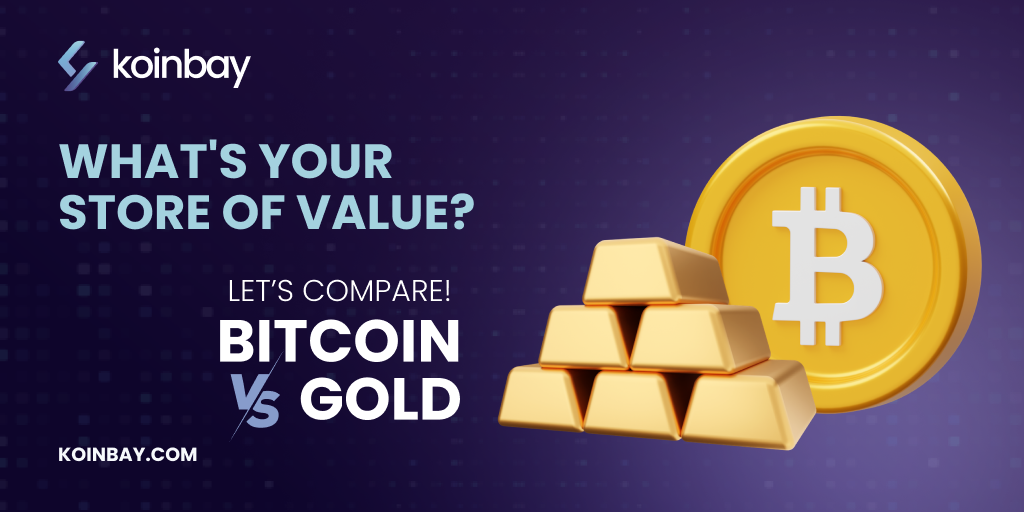In today’s diverse financial landscape, gold and cryptocurrencies such as Bitcoin have emerged as prominent stores of value. The debate of Gold vs. Crypto highlights their unique attributes and different purposes in a portfolio. This article explores the characteristics, benefits, and risks, providing a balanced perspective on holding both assets.
Gold: The Timeless Asset
Gold has been a symbol of wealth and a reliable store of value for centuries. Its intrinsic value and historical significance make it a popular choice for those looking to preserve wealth.
Characteristics of Gold
- Intrinsic Value: Gold is valued for its rarity, durability, and unique physical properties. It has been used in jewelry, technology, and as a form of currency for millennia.
- Stability: Gold’s price tends to be stable compared to other assets, making it a safe haven during economic downturns.
- Liquidity: Gold is highly liquid. It can be easily bought and sold in global markets.
- Inflation Hedge: Historically, gold has served as a hedge against inflation. During periods of high inflation, gold prices often rise as the purchasing power of currency declines.
Data and Statistics
- As of May 2023, the total market capitalization of gold is approximately $11 trillion. Source: CoinMarketCap
- Gold has shown an average annual return of around 10% over the past decade. Source: Wikipedia
- During the 2008 financial crisis, gold prices surged by nearly 25% as investors sought safe-haven assets. Source: Macrotrends
Bitcoin: The Digital Gold
Bitcoin, often referred to as “digital gold,” has gained popularity as a decentralized digital asset. Created in 2009, this digital asset offers a new form of value storage that operates outside traditional financial systems.
Characteristics of Bitcoin
- Decentralization: Bitcoin operates on a decentralized network of computers, making it resistant to censorship and control by any single entity.
- Limited Supply: Bitcoin has a fixed supply of 21 million coins, creating a scarcity similar to gold.
- Portability: Bitcoin can be easily transferred across borders, making it a highly portable asset.
- Transparency and Security: Transactions on the Bitcoin network are transparent and secured by blockchain technology, reducing the risk of fraud.
Data and Statistics
- As of May 2023, Bitcoin’s market capitalization is around $600 billion. Source: CoinMarketCap
- Bitcoin has experienced significant growth, with an average annual return of approximately 200% since its inception. Source: CoinGecko
- In 2020, during the COVID-19 pandemic, Bitcoin’s price increased by over 300%, highlighting its appeal as a store of value in times of uncertainty. Source: CoinDesk
Gold vs. Crypto [Bitcoin]
Similarities
| Store of Value | Both gold and Bitcoin are considered effective stores of value, preserving wealth over time. |
| Scarcity | Gold’s physical scarcity and Bitcoin’s capped supply contribute to their perceived value. |
| Hedge Against Economic Uncertainty | Both assets are sought after during economic crises or periods of high inflation. |
Differences
| Gold | Bitcoin | |
| Tangibility | Physical Asset | Digital |
| History | Long history as a store of value | Relatively new phenomenon |
| Volatility | More stable | Fluctuates as per the price |
| Regulatory Environment | Widely recognized and regulated | Varying degrees of regulatory scrutiny worldwide |
Gold vs. Crypto – Which One Wins as a Store of Value?
Rather than debating the superiority of gold or cryptocurrencies as stores of value, a prudent approach recognizes the benefits of both. Combining them in a diversified portfolio allows for effective risk mitigation and potential growth.
Gold, with its historical legacy and universal acceptance, represents stability and reliability. Its tangible nature provides security. Cryptocurrencies, led by Bitcoin, offer digital innovation and value preservation potential. Their transparency and integration into payment systems make them appealing.
By diversifying with gold and cryptocurrencies, investors leverage the strengths of each. Gold hedges against uncertainty, while cryptocurrencies offer growth opportunities. Striking this balance allows for long-term value preservation and growth.
Closing Points
In summary, while both gold and Bitcoin present unique advantages as stores of value, it’s crucial to undertake thorough research before making any decisions regarding your portfolio.
Please note that this information is not intended as financial advice; any decisions made are your responsibility. We strongly recommend evaluating your individual circumstances, goals, and risk tolerance to make well-informed choices. By doing so, you can ensure that your decisions align with your financial objectives and long-term strategy.
Follow KoinBay to stay updated with all the latest news, updates, and happenings in the crypto world. Join us and become part of a thriving, supportive community!
Telegram — Twitter — Facebook — Instagram — LinkedIn — YouTube
Disclaimer: This article incorporates insights and content generated by language model and other AI technologies. While the author has made every effort to ensure the content’s accuracy and reliability, neither the author nor KoinBay can guarantee the absolute correctness, comprehensiveness, or dependability of all information provided.
Cryptocurrency trading inherently carries significant risks. It’s not suited for everyone. Before engaging in cryptocurrency trading, it’s essential to evaluate your investment goals, experience, and risk tolerance. It’s possible that you could experience a total or partial loss of your investment, hence only invest what you can afford to lose entirely. Understand all risks associated with cryptocurrency trading and consider seeking counsel from an independent financial advisor. Participating in ICOs, IEOs, STOs, or any other offerings doesn’t assure any returns on your investment.
Always stay informed and exercise caution when dealing with cryptocurrencies and related technologies.


